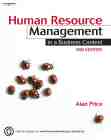Bestselling Books
|
Bestselling Books |
|
| US Bestsellers UK Bestsellers France - Meilleurs Ventes Canada Bestsellers Germany Bestsellers |
 Hooked on books? BestBooks.biz features book-related articles, book extracts and book selections from the best books - past and present. |
HRM - Measurement and Assessment ProblemsAdapted from Human Resource Management in a Business Context, 3rd edition (2007) Beer et al (Human Resource Management: A General Manager's Perspective Text and Cases by Michael Beer, Richard E. Walton, Bert A. Spector, 1985) say that the four Cs provide a focus and a framework for thinking about real-life HRM. But they do not provide the tools for measuring or assessing how an organization's human resource policies actually impact on that organization. In fact, it could be argued that the Harvard map gets distinctly blurred at this point. There is talk of methods being numerous, of being different because of choices in the level of analysis, of competences being assesed by internal or external assessors. And then somehow: "When such data are looked at in the aggregate, particularly when a company tries to determine the talent it has available for succession planning, a picture emerges of the depth in technical or managerial competence in the organization." The authors are a bit more precise when they talk about employee commitment and suggest that data can come from attitude surveys conducted through interviews and questionnaires. These can be conducted by HR specialists emplloyed by the organization or by outside consultants. Beyond this they suggest: - open-door policies and observations of group meetings in which employees are encouraged to
be free with their opinions;
The authors state that: "Taken together, such data might fall short of providing managers with an absolute measure of commitment and congruence, but they can provide a useful overall picture." Wisely the authors say that cost effectiveness may seem easier to measure, but this apparent simplicity may be deceiving. They draw a contrast between the assessment of wages (easy), longer-term costs of profit-sharing plans, cost-of-living adjustments (all more difficult because of future uncertainties), recruitment and employee development costs (very difficult). Congruence of goals are easily identified through their absence - for example, when there is open conflict like strikes. More subtle conflicts are not so easy to spot and evaluate. In fact, as the authors say: "the impact of accumulated grievances on organizational performance is far more difficult to assess." Beer et al say that measuring the consequences of human resource policies on employee and societal well-being is even more difficult. They argue that stakeholders have participate in assessing HRM outcomes for this to be possible and outline some 'governance mechanisms which could form the vehicles for this. Participation could take the form of union-management task forces or employee committees (where organizations are not unionized). Works councils and collective bargaining processes legislated governance mechanisms serving the same purpose. The assessment of HRM outcomes, they conclude, is not an easy problem to solve. They argue that the experiments in human resource accounting systems (by the time they were writing) which tried to deal with people 'as if they were in the same metric as financial resources (dollars)' have not been successful judging by the infrequent use of such methods. And trying to attach a value to employee commitment or organizational culture is considerably more difficult. This article is based on Human Resource Management in a Business Context by Alan Price (3rd edition, 2007) . |
 in a Business Context by Alan Price
|
|
|
|
|
|
|
|
|
| Copyright © 2000-20l7 Alan Price and BestBooks.biz contributors. All rights reserved. |